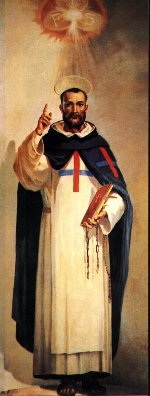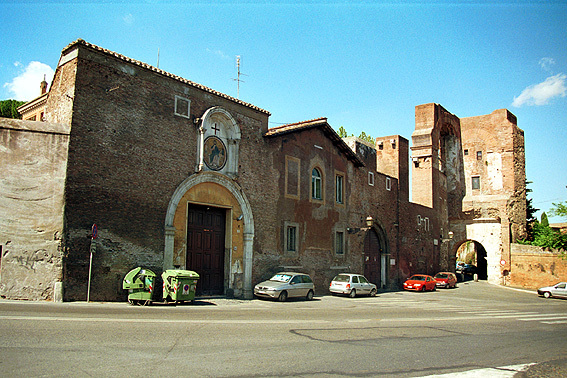
That he might set himself with due forethought to the carrying out of his work, he withdrew into a certain desert, and there, by the will of God, he found Felix of Valois, who had already spent many years in that place. With him he joined company, and they passed three years together in continual prayer, meditation, and all spiritual exercises. It came to pass, one day, when they were sitting on the bank of a spring, that there came to them a stag having between his horns a cross of red and blue. Felix cried out in wonder at that sight, and John then told him of the vision that had appeared to him when he was saying his first Mass. Thenceforth they gave themselves with redoubled fervour to prayer, and, being three times warned in sleep, they determined to go to Rome, and pray the Pope to institute an Order for the ransom of captives. They arrived at the time of the election of Innocent III, who received them courteously, and entertained in his mind their petition. While he was in consideration, he went to the Lateran Cathedral, on the second Feast of St. Agnes, and there, while Mass was being solemnly sung, at the moment of the elevation of the Sacred Host, there appeared to him an angel, clad in raiment white and glistering, having sewn on his breast a cross of red and blue, and making as though he would free prisoners. Thereupon the Pope founded the Order, commanding that it should be called the Order of the Most Holy Trinity for the Ransom of Captives, and that they who professed in it should be clad in white raiment, having sewn on their breasts a cross of red and blue.
The Order being thus established, the holy Founders returned into France, and built their first Convent at Cerfroid, in the diocese of Meaux. Felix remained in charge of this house, and John went back to Rome with several companions. To them Innocent gave the house, church, and hospital of St. Thomas in Formis on the Caelian Hill, with great endowments and property. Moreover he gave them a letter of introduction to Miramolin, King of Morocco, and they began with bright hopes the work of ransoming captives. John next betook himself to Spain, great part of which was then in the hands of the Saracens, and stirred up the hearts of the kings, princes, and all the faithful to have pity on slaves and the poor. He built convents, founded hospitals, and ransomed many bondsmen, to the great gain of souls. At last he returned to Rome, still busied in good works, but worn out by unceasing toil, and weakened by sickness. As he drew near the end of his earthly pilgrimage, his burning love for God and for his neighbour suffered no diminution. He called together his brethren, and earnestly exhorted them to go on with that work of ransom which had been pointed out to them from heaven, and then fell asleep in the Lord, on the 21st day of December in the year of salvation 1213. His body was buried with due honour in the Church of St. Thomas in Formis.





